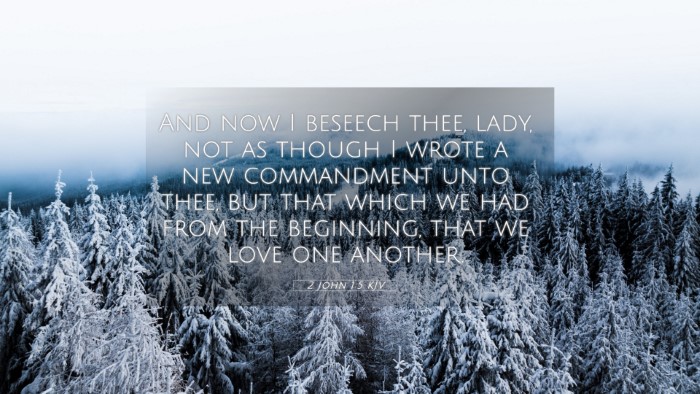Understanding 2 John 1:5
2 John 1:5 states: "And now I plead with you, lady, not as though I wrote a new commandment to you, but that which we have had from the beginning: that we love one another." This verse emphasizes the importance of love within the Christian community, echoing teachings that appear throughout the New Testament.
Summary of Meaning
This verse serves as a reminder that love is not merely a suggestion but a command that has existed from the very inception of the Christian faith. John emphasizes the continuity of this commandment, suggesting that the essence of Christian doctrine revolves around the concept of love.
Insights from Public Domain Commentaries
-
Matthew Henry:
Matthew Henry suggests that the 'lady' mentioned may symbolize the Church or individual believers. His interpretation centers on the idea that true love must be demonstrated among believers, replicating the love of Christ. He emphasizes that our love must be both sincere and active, transcending mere words and manifesting in deeds.
-
Albert Barnes:
Barnes points out that this commandment regarding love was not new but fundamental to the teachings of Christ. He underscores the importance of adhering to this command in a world where love can sometimes be overshadowed by selfishness and division. Barnes also explains that keeping this command opens the door to a closer communion with God.
-
Adam Clarke:
Clarke notes the letter’s intimate tone, suggesting that John’s appeal is personal and directed toward a collective of believers. He highlights that obedience to love fosters unity and strengthens the faith community. Clarke stresses that this commandment ties into the overarching narrative of the Gospel, emphasizing the necessity of mutual care among believers.
Bible Verses Cross-References
To understand 2 John 1:5 in context, we can consider several related Bible verses that reinforce its themes:
- John 13:34-35: "A new commandment I give to you, that you love one another: just as I have loved you, you also are to love one another."
- 1 John 3:11: "For this is the message that you have heard from the beginning, that we should love one another."
- Romans 13:10: "Love does no wrong to a neighbor; therefore love is the fulfilling of the law."
- 1 Corinthians 13:1-3: "If I speak in the tongues of men and of angels, but do not have love, I am a noisy gong or a clanging cymbal."
- Galatians 5:14: "For the whole law is fulfilled in one word: you shall love your neighbor as yourself."
- Ephesians 5:2: "And walk in love, as Christ loved us and gave himself up for us, a fragrant offering and sacrifice to God."
- 1 Peter 4:8: "Above all, keep loving one another earnestly, since love covers a multitude of sins."
Connections Between Bible Verses
The concept of love as a foundational command is consistently reiterated throughout the scriptures. The inter-Biblical dialogue reveals a thematic connection that emphasizes love not only as a virtue but as the defining characteristic of followers of Christ. This continuity illustrates how various texts relate to and support one another.
Tools for Bible Cross-Referencing
To explore these themes further, readers may utilize various biblical reference resources, such as:
- Bible concordance
- Bible cross-reference guide
- Cross-reference Bible study tools
- Bible reference materials for sermon preparation
How to Use Bible Cross-References
When studying passages like 2 John 1:5, it is valuable to engage in cross-referencing Bible study methods. This approach helps in identifying connections between Old and New Testament principles and understanding how they interrelate in God's overall plan for humanity.
Conclusion
2 John 1:5 is a profound reminder of the enduring command to love one another. Drawing from multiple scripture verses reinforces the belief that love is indispensable in the Christian faith. Through comparative Bible verse analysis, believers can gain deeper insights into the nature of love and its manifestation within the community of faith.

















